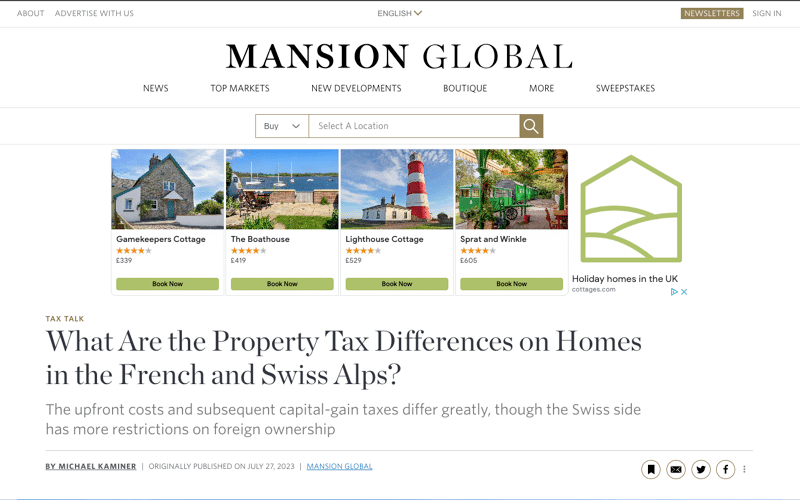Manion Global

What Are the Property Tax Differences on Homes in the French and Swiss Alps?
Every week, Mansion Global poses a tax question to real estate tax attorneys and other experts. Here is this week’s question.
28 July 2023
The upfront costs and subsequent capital-gain taxes differ greatly, though the Swiss side has more restrictions on foreign ownership
Every week, Mansion Global poses a tax question to real estate tax attorneys and other experts. Here is this week’s question.
Q: I’m thinking about buying a chalet in the Alps, and I understand transfer fees and taxes differ on the French and Swiss sides. How do they compare?
A: There are significant differences between the two regions, and they go beyond taxes and fees.
In the French Alps, as in the rest of France, “there is a total purchase-cost envelope of 7.5%, which covers registration fees, stamp duty, and notary costs,” said Roddy Aris, a London-based partner at Knight Frank who specializes in residential property in the French Alps and Paris.
“However—and this is a big ‘however’—there is a big incentive to buy new-build properties, which greatly reduces your stamp duty” from 7.5% to 1.8%, Aris said. “New” means less than 5 years old, Aris noted. To qualify, buyers must purchase the property from a VAT-registered developer, also known as value-added tax, he added.
The purchase is also subject to 20% value-added tax, although buyers in the French Alps can take advantage of another nationwide tax break to get it back.
“If you rent out your property, and provide certain hotel-like services, you can claw back that 20%,” he said. “Doing that with a pied-à-terre in Paris would be complicated, because it’s impossible to get a rental license. There’s a lot less red tape in the mountains. And it makes sense for most people because their use of the property is seasonal.”
The picture changes dramatically in Switzerland, which imposes multiple restrictions on buyers.
“The purchase of residential real estate is limited to people with Swiss passports or who are residents of Switzerland,” said Alex Koch de Gooreynd, a London-based partner at Knight Frank whose specialty is Swiss, Austrian and Portuguese property. While so-called “holiday zones” like the Alps are exempt, “foreigners can still buy just one property per named individual in those holiday zones, with a maximum 200 square meters of official living space,” he said.
Buyers on the Swiss side are finding exceptions with properties they can turn into hotels, “which the Swiss see as commercial, not residential investments. So, if you’re going to turn a property into a hotel, you can buy as many as you want, whatever size, and rent them for as long as you want,” he said.
Property transfer taxes in Switzerland vary by canton, and amount to 1%-3% of the purchase price. Owners of property in Switzerland, including second-home owners, also pay an annual “wealth tax” determined by each canton.
In France, Aris said, a wealth tax “only kicks in when your net exposure exceeds €1.3 million [US$1.44 million]. Strategies to bring that down include borrowing to bring down your exposure, or putting a property in multiple names.”
As a result of laws on foreigners and second-home buyers, “there is severely limited stock in Switzerland,” said Giles Gale, founder and managing director of London-based real-estate company Alpine Property Finders. “France has the only Alpine market that has yet to bring in widespread restrictive second-home laws, which is a positive for that market.”
In the event of a sale, Gale noted that capital-gains taxes differ between France and Switzerland. On the Swiss side, capital-gains tax decreases with each year of ownership, starting at 30% and decreasing to 9% after 10 years and 1% after 25 years. In France, the sale of a principal residence would not incur capital-gains tax, but the sale of a vacation home would trigger a flat 19% levy, along with 17.2% in “social charges,” taxes that benefit France’s social-security system. Like Switzerland, France reduces capital-gains taxes the longer you own a property, and erases them altogether after 22 years of ownership.
Read the Article

